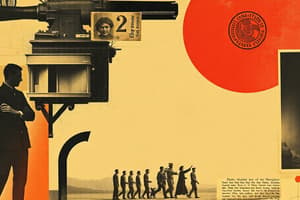Podcast
Questions and Answers
Who is recognized as the 'Father of the Indian Constitution'?
Who is recognized as the 'Father of the Indian Constitution'?
- Sardar Vallabhbhai Patel
- Jawaharlal Nehru
- Mahatma Gandhi
- Dr. B.R. Ambedkar (correct)
What significant event is celebrated as Constitution Day in India?
What significant event is celebrated as Constitution Day in India?
- Republic Day
- Adoption of the Constitution (correct)
- Independence Day
- Formation of the Lok Sabha
How many parts does the Indian Constitution currently have?
How many parts does the Indian Constitution currently have?
- 30
- 22
- 40
- 25 (correct)
What is the main purpose of the preamble of the Constitution?
What is the main purpose of the preamble of the Constitution?
What does an 'Article' in the Indian Constitution represent?
What does an 'Article' in the Indian Constitution represent?
What is the significance of the Directive Principles of State Policy in the Indian Constitution?
What is the significance of the Directive Principles of State Policy in the Indian Constitution?
Which statement about the article count of the Indian Constitution is true?
Which statement about the article count of the Indian Constitution is true?
What are fundamental rights primarily designed to protect in the context of the Indian Constitution?
What are fundamental rights primarily designed to protect in the context of the Indian Constitution?
What is the primary function of schedules in the Indian Constitution?
What is the primary function of schedules in the Indian Constitution?
Who chaired the Drafting Committee responsible for preparing the Indian Constitution?
Who chaired the Drafting Committee responsible for preparing the Indian Constitution?
On what date was the Indian Constitution adopted by the Constituent Assembly?
On what date was the Indian Constitution adopted by the Constituent Assembly?
What significant change occurred on 26th January 1950 regarding the Indian Constitution?
What significant change occurred on 26th January 1950 regarding the Indian Constitution?
Which of the following is NOT a key importance of the Indian Constitution?
Which of the following is NOT a key importance of the Indian Constitution?
How does the Indian Constitution address the issue of government authority?
How does the Indian Constitution address the issue of government authority?
What is one of the democratic principles upheld by the Indian Constitution?
What is one of the democratic principles upheld by the Indian Constitution?
What role does the Indian Constitution play in promoting national unity?
What role does the Indian Constitution play in promoting national unity?
What is the significance of the separate powers defined in the Indian Constitution?
What is the significance of the separate powers defined in the Indian Constitution?
Which of the following statements about the Drafting Committee is true?
Which of the following statements about the Drafting Committee is true?
Flashcards are hidden until you start studying
Study Notes
Introduction to the Constitution
- Constitution serves as the supreme law and framework for India’s political system, defining government powers and responsibilities.
- Dr. B.R. Ambedkar is honored as the “Father of the Indian Constitution.”
- Constitution Day, or ‘Samvidhan Divas’, is celebrated on 26th November annually to mark the adoption of the Constitution.
Structure of the Indian Constitution
- Indian Constitution is among the longest and most detailed in the world with multiple components.
- Parts: Originally 22 parts, now expanded to 25, organizing articles on similar subjects.
- Articles: Numbered provisions defining legal and governmental frameworks; initially 395 articles, now 448.
- Schedules: Lists providing details on constitutional provisions; originally 8, now 12 schedules enhance clarity and functionality.
Enactment and Adoption
- Constituent Assembly established in 1946, led by Dr. Rajendra Prasad as President.
- Drafting Committee formed on 29th August 1947, chaired by Dr. B.R. Ambedkar.
- Drafting process lasted 166 days over 2 years, culminating in the final draft introduced on 4th November 1948.
- Constitution adopted on 26th November 1949, with some provisions coming into force that day.
- Major portions enacted on 26th January 1950, marking India’s status as a sovereign republic.
Importance of the Constitution
- Rule of Law: Ensures all individuals, including officials, are subject to the law.
- Protection of Rights: Guarantees fundamental rights such as free speech and religion, with legal recourse against infringements.
- Government Structure: Defines roles and limitations for executive, legislative, and judicial branches, promoting checks and balances.
- Democratic Principles: Upholds democracy through universal suffrage, ensuring citizen participation in elections.
- Stability and Continuity: Guides governance to maintain political stability and prevent abrupt changes.
- National Unity: Encourages national cohesion while acknowledging citizen diversity, fostering common citizenship.
Studying That Suits You
Use AI to generate personalized quizzes and flashcards to suit your learning preferences.



